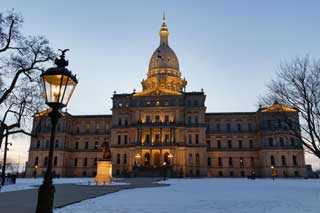Lansing Update: Tax Relief for the Poor Among Early Legislative Priorities
Posted January 13, 2023
In this update:
- Increase to Earned Income Tax Credit Among Early Proposals Introduced in New Legislature
- An Update on the Let MI Kids Learn Scholarship Proposal
- U.S. House Approves Bill Requiring Care for Children Born Alive After Abortion
- Prayer for Lawmakers as New Session Begins
Increase to Earned Income Tax Credit Among Early Proposals Introduced in New Legislature
The new legislative session in Michigan is officially here and is off to a promising start with the introduction of a bill to continue the momentum toward increasing the state's Earned Income Tax Credit (EITC) and helping the working poor.
Among the first bills introduced in the state Senate this week—Senate Bill 3—is a proposal to increase the state EITC to 30% of the federal credit, much like legislation that Michigan Catholic Conference (MCC) and a coalition of groups have advocated for since last session. New Sen. Kristen McDonald Rivet (D-Bay City) is the sponsor of Senate Bill 3.
The Michigan EITC Coalition includes MCC and now more than 230 groups around the state that support a boost to the EITC, including influential state business, religious, health and social services organizations.

Tom Hickson, vice president of public policy at MCC, was quoted in a coalition press release celebrating Senate Bill 3 this week, saying, “While encouraging the human dignity that comes with work, the EITC is a pro-family, pro-children policy that provides a level of stability and assistance to help less affluent families get by and cover necessary expense and emergencies. Expanding the EITC will particularly help rural areas of Michigan, where more people are often in low-paying jobs than in more urban communities.”
The EITC coalition sent letters to lawmakers and the Governor this week continuing to urge action on the policy. Gov. Gretchen Whitmer and the Democratic legislative majority, along with legislative Republicans, have all said they favor enacting an increase to the EITC as an early policy priority in 2023.
It is believed that movement on the EITC could come as early as next week, and members of CAN could expect to see an action alert to contact their elected officials and urge a yes vote on the legislation next week.
The EITC is a refundable credit aimed at helping the working poor afford more of the necessities of life. Currently, a family of four with $37,500 of earned income could claim $200 in a state EITC at the current 6 percent. Under the proposal to boost the state EITC to 30%, that would go to $999 for that same family.
An Update on the Let MI Kids Learn Scholarship Proposal
Last year, Catholic parishes and schools were called on to help gather signatures to implement a new student scholarship program aimed at helping low-income families attending both public and private schools with out-of-pocket education expenses.
MCC, with the approval of Michigan's bishops, participated in the campaign to improve access and choice for education in Michigan and to help more public and private low-income students afford education resources, whether it be tuition, books, technology, transportation and more.
Thanks to the efforts of many volunteers across the state, the initiative known as Let MI Kids Learn successfully collected more than the minimum number of signatures to get the scholarship proposal to the Legislature, which could have approved it without the Governor's signature. This was necessary because the Governor had vetoed similar legislation in 2021, which prompted the signature-gathering drive to commence in 2022.
Let MI Kids Learn submitted the petitions for validation to the state in August 2022, which was past the deadline for consideration for the 2022 ballot, which is where the petition would have gone if the Legislature did not approve it. Because of that, the state had until June 2024 to evaluate the signatures.
Since the submission of the signatures, the November election changed control of the Legislature from Republicans—who had supported the scholarship program—to Democrats. Despite efforts by Let MI Kids Learn to persuade the state to finish evaluating the signatures and allow the proposal to go before the previous Legislature, the legislative majority changed hands and the state did not complete the evaluation of the signatures.
Now, it is unlikely that the new legislative majority would approve the program, meaning the proposal would have gone to the ballot in 2024, which would require millions of dollars in resources to get it passed by the voters. The Let MI Kids Learn committee made the decision to withdraw the signatures submitted to the state, which has been granted, ending the initiative to implement the scholarship program.
We want to acknowledge and thank every person who helped gather signatures for this initiative in parishes and schools last year. While this is a disappointing outcome, MCC will continue to work toward and look for opportunities to improve education choice in Michigan and to aid parents in their roles as the primary educators of their children.
U.S. House Approves Bill Requiring Care for Children Born Alive After Abortion
The U.S. House this week passed a bill to ensure children born alive after a failed abortion would receive appropriate medical care.
H.R. 26, which was supported by the U.S. Conference of Catholic Bishops (USCCB), would require health care providers to give children born alive after an attempted abortion the same medical care that they would for any child born at that same gestational age and to transport them to a hospital.
“Babies who are born alive during the process of an abortion deserve compassionate care and medical attention—just the same as any other newborn baby,” said Bishop Michael F. Burbidge of Arlington, chair of the USCCB Committee for Pro-Life Activities, in a statement.
Despite this measure ensuring all children born alive are provided health care, the vote passed mostly along party lines, with all of Michigan's Republican Congress members voting yes and all of Michigan's Democratic Congress members voting no.
Prayer for Lawmakers as New Session Begins
This past Wednesday marked the first day of the new legislative session in Michigan. Join us in praying for our state lawmakers as they begin their work:
God of all nations, Father of the human family, we give you thanks for the freedom we exercise and the many blessings of democracy we enjoy in these United States of America and particularly in our state of Michigan.
We ask for your protection and guidance for all who devote themselves to the common good, working for justice and peace at home and around the world.
We lift up all our duly elected leaders and public servants, particularly those who will serve us as legislators in Michigan this session.
Heal us from our differences and unite us, O Lord, with a common purpose, dedication, and commitment to achieve liberty and justice in the years ahead for all people, and especially those who are most vulnerable in our midst.
Amen.
(Prayer, with slight edits, courtesy of USCCB)

